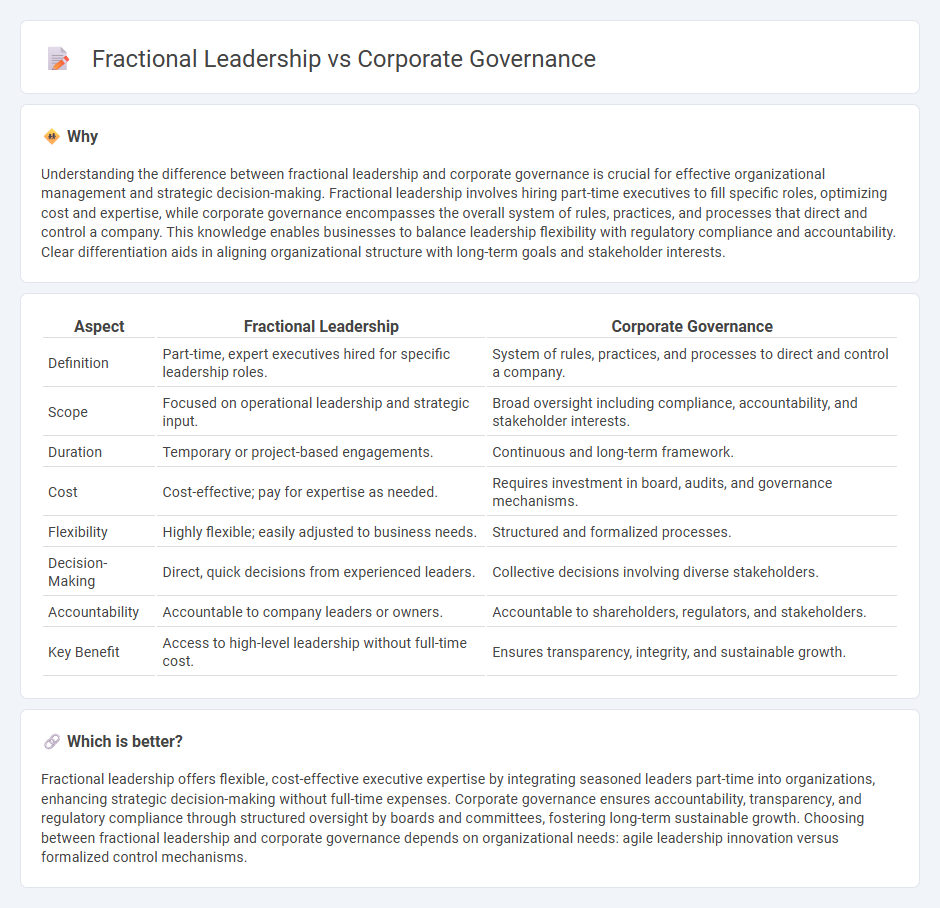
Fractional leadership offers flexible management solutions by providing expert executives on a part-time basis, optimizing resources for growing businesses without the cost of full-time salaries. Corporate governance ensures accountability and regulatory compliance through structured policies and oversight from boards, protecting stakeholders' interests and fostering sustainable growth. Explore the differences and benefits of fractional leadership versus corporate governance to enhance your organization's management strategy.
Why it is important
Understanding the difference between fractional leadership and corporate governance is crucial for effective organizational management and strategic decision-making. Fractional leadership involves hiring part-time executives to fill specific roles, optimizing cost and expertise, while corporate governance encompasses the overall system of rules, practices, and processes that direct and control a company. This knowledge enables businesses to balance leadership flexibility with regulatory compliance and accountability. Clear differentiation aids in aligning organizational structure with long-term goals and stakeholder interests.
Comparison Table
| Aspect | Fractional Leadership | Corporate Governance |
|---|---|---|
| Definition | Part-time, expert executives hired for specific leadership roles. | System of rules, practices, and processes to direct and control a company. |
| Scope | Focused on operational leadership and strategic input. | Broad oversight including compliance, accountability, and stakeholder interests. |
| Duration | Temporary or project-based engagements. | Continuous and long-term framework. |
| Cost | Cost-effective; pay for expertise as needed. | Requires investment in board, audits, and governance mechanisms. |
| Flexibility | Highly flexible; easily adjusted to business needs. | Structured and formalized processes. |
| Decision-Making | Direct, quick decisions from experienced leaders. | Collective decisions involving diverse stakeholders. |
| Accountability | Accountable to company leaders or owners. | Accountable to shareholders, regulators, and stakeholders. |
| Key Benefit | Access to high-level leadership without full-time cost. | Ensures transparency, integrity, and sustainable growth. |
Which is better?
Fractional leadership offers flexible, cost-effective executive expertise by integrating seasoned leaders part-time into organizations, enhancing strategic decision-making without full-time expenses. Corporate governance ensures accountability, transparency, and regulatory compliance through structured oversight by boards and committees, fostering long-term sustainable growth. Choosing between fractional leadership and corporate governance depends on organizational needs: agile leadership innovation versus formalized control mechanisms.
Connection
Fractional leadership enhances corporate governance by providing expert oversight and strategic direction without the costs of full-time executives, ensuring compliance and fiduciary responsibilities are met efficiently. This model strengthens board decision-making through specialized skills and diverse perspectives, improving risk management and stakeholder accountability. By integrating fractional leaders, organizations achieve agile governance structures that adapt to evolving regulatory environments and business complexities.
Key Terms
**Corporate Governance:**
Corporate governance refers to the system of rules, practices, and processes by which a company is directed and controlled, ensuring accountability, fairness, and transparency in its relationship with stakeholders. It involves the roles of the board of directors, executive management, and shareholders in overseeing the company's strategic direction and compliance with legal and ethical standards. Explore more about how effective corporate governance drives sustainable business success and stakeholder trust.
Board of Directors
Corporate governance establishes the framework of rules, practices, and processes guiding a Board of Directors to ensure accountability, fairness, and transparency in a company's management. Fractional leadership offers part-time, specialized expertise to the Board, enabling agile decision-making without the full-time commitment of traditional executives. Discover how integrating fractional leadership can enhance your board's strategic impact and governance effectiveness.
Accountability
Corporate governance establishes frameworks ensuring accountability through board oversight, compliance, and transparent reporting, fostering stakeholder trust. Fractional leadership provides specialized, part-time executives who deliver targeted accountability in financial, operational, or strategic roles without full-time commitment. Explore how integrating these approaches can optimize accountability across your organization.
Source and External Links
Does Corporate Governance Matter? - Corporate governance is the system by which companies are directed and controlled, with responsibilities including setting strategic aims and supervising management.
Understanding Corporate Governance: The 2025 Guideline - Corporate governance refers to the set of rules, practices, and processes that direct and control a company, ensuring accountability and ethical conduct.
Corporate Governance: What It Is and Why It Matters - Corporate governance is the system of rules, practices, and processes by which a company is directed and controlled, enhancing decision-making and reducing risks.
 dowidth.com
dowidth.com